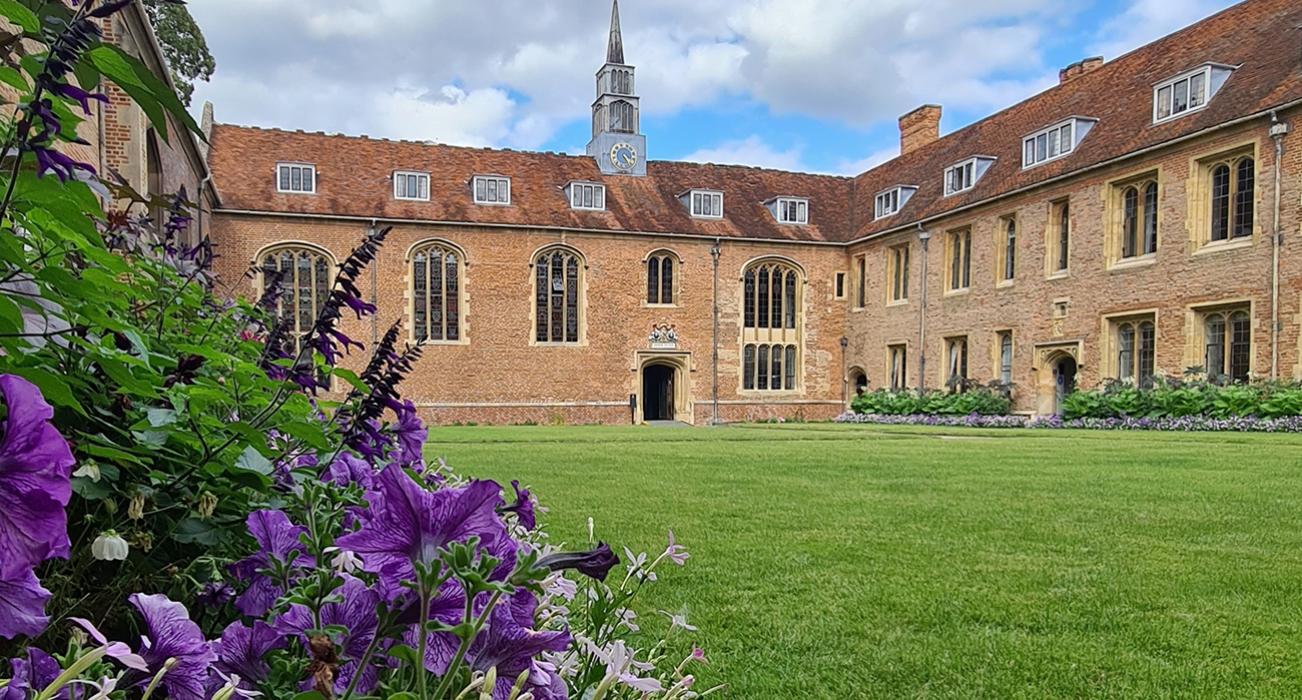In Search of Britain’s Utopias
 Dr Vitaliev's dedication to enhancing students' writing skills through personalised tutorials has helped many to achieve clarity and confidence in their writing. An award-winning author, journalist, and teacher, Vitali brought a wealth of experience and knowledge, with his unique insights and love for the written word. We extend our heartfelt gratitude for his contributions and wish him all the best in his future endeavours.
Dr Vitaliev's dedication to enhancing students' writing skills through personalised tutorials has helped many to achieve clarity and confidence in their writing. An award-winning author, journalist, and teacher, Vitali brought a wealth of experience and knowledge, with his unique insights and love for the written word. We extend our heartfelt gratitude for his contributions and wish him all the best in his future endeavours.
To mark the end of his tenure, Dr Vitaliev gave a captivating talk presenting his upcoming book, Britain’s Utopias, Trucks in the Garden of Eden, where he featured Magdalene College as one of his top ten utopias (extract below).
In his new book, Vitali takes stock of Britain today, investigating the nation’s various attempts to create utopian communities, from the Garden City that inspired Lenin to alcohol-free model villages and rural retreats from modern chaos. Through this journey, he reflects on his childhood in the USSR during the Cold War, posing thought-provoking questions about the validity of utopian ideas throughout history and their meaning in contemporary Britain. We look forward to the publication of this insightful work and celebrate the lasting impressions Dr Vitaliev has made on our community.
Edited extract from ‘Trucks in the Garden of Eden. In Search of Britain’s Utopias’
At the press of a button, the heavy iron-clad doors of the underground car park open slowly, almost reluctantly, and I, squinting at the sudden burst of bright sunlight, step into a peculiar ‘bubble’ having little to do with the rest of the world, an alternative universe and my life’s ultimate Utopia – the perennially sun-drenched (in my eyes, at least) campus of Magdalene College, University of Cambridge.
The first creature to greet me there is our College’s resident swan – probably, a Fellow like me – sitting in his nest right opposite the car park entrance.
He can easily be a descendant of my imaginary wagonette-pulling swans from Victorian Britain, the sweet Utopia of my childhood...
Slowly, as if savouring every step, I walk across Benson Court towards the gates. The neat gravel path is lined with bushes and flowers. Tended by a team of our staff gardeners, they appear to be blooming and blossoming all through the year – even in winter!
The true Garden of Eden, with no trucks in it!
I open the gates with my electronic pass card, cross the narrow road trying to dodge the ubiquitous and indiscriminate cyclists, who look as if they wouldn’t mind running over an elderly university don, I enter the College’s First Court and pop into the Porters’ Lodge to check my pigeon hole for correspondence.
Clutching a small pile of letters, I puff up the steep stairs of the late 17th century building to my office in the attic. The last flight of steps is so steep that it is almost vertical, and climbing up it takes some effort. I often use t as an example of bad writing during the tutorials with students: “Good writing for a reader is smooth like the surface of my desk, and bad writing is like stairs to my office”.
“PARADIS E” runs the plate on the door next to mine. No, I am not hallucinating. The room between my office and the one of ‘PROF. Raven is occupied by Elizabeth Paradis – a
francophone postgraduate student from Quebec, who asked for her name on the doorplate to be written thus.
So I can say without any qualms that my Cambridge University office is right next door to ‘paradise’.
... It takes me a minute or so to regain my breath inside my spacious office, with beams and vaulted ceilings. One of the windows is facing the College’s magnificent 18th century Chapel, the domain of our Chaplain and my good friend Sarah Atkins, with whom we conducted a vigil for Ukraine in April 2022, shortly after my mother country was invaded by Russia. It was there, in the Chapel, that I was ‘anointed’ a Fellow by Sir Christopher Greenwood, the College Master, who succeeded Rowan Williams, the former Archbishop of Canterbury, in that post....
“Do not try to understand how the College works. The only thing you need to remember is be nice to everyone,” such was the valedictory for the new Fellows from Professor Brendan Burchill, then the College President.
... When in my office, I do not require a watch, for I can tell the time by the Chapel’s clock opposite my window and by the chimes of its bells, albeit for me, time in its normal sense does not seem to exist in the College.
“Time flies when you’re having fun” is a common English adage. Its Russian equivalent, however, is somewhat stronger. Stemming from Alexander Griboyedov’s classical comedy ‘Gore ot Uma’ (‘Woe from Wit’), it can be translated word-for-word as “Those who are happy do not hear the clock strike”.
From my very first days as Magdalene’s Fellow, I’ve been incredibly, almost indescribably, happy. Happy to the point when I feel tempted to pinch myself every so often to make sure I am not dreaming.
... When introduced to Cambridge and its colleges by Clive James during my first visit to Britain in 1988, I had pangs of painful regret at the thought that I would never be part of that breathtaking townscape, all-too-familiar from books and movies, with college spires, cobbled streets, cyclists, swans, punts on the River Cam, and cows grazing on college greens.
33 Years later I did become part of my own long-time Utopia. To the point when the ever-so-observant student touts, tirelessly trying to solicit pedestrians for punting, have left me alone and pretend to ignore me when I walk past them, as if I were a local, a piece of familiar furniture, an integral and
almost invisible part of the never-changing Cambridge scene...
In the intervals between tutorials, I walk to the Market Square to browse in my favourite Cambridge University Bookshop, where I want to buy and devour all the books on display and where – rather dangerously for my budget – I enjoy a 20 percent discount,
I then browse through the bookstall in the middle of the square, where, as my late friend Clive James told me, he used to often buy the books that he already owned for the sheer pleasure of carrying them home...
My several years in Cambridge helped me realise how much I enjoy teaching. And it is great to know that students seem to like my talks and tutorials too. Here’s just one short quote from a thank-you card I received from a student in the end if an academic year:
“It has been an honour to learn, unlearn and relearn writing with you, Vitali. Truly, ‘life is a literary device’ (a title of one of my books – VV), and a few lines are better than a blank page.”
I very much enjoy the college life: conversations with my fellow Fellows in the Common Room, talks, exhibitions,
lunches, and of course, the frequent High Table dinners in the historic Hall, the oldest in Cambridge and the only one with no electric wires, just candlelight, accentuating, enlarging and projecting on the wall long shadows of the Fellows as we slip into the Hall in two lines, and the students stand up to greet us. Candlelight dances on ceremonial old portraits on the wall and makes them come to life, particularly that of Lord Audley, a Henry VIII look-alike, who founded the College on the grounds of a Benedictine monks’ hostel nearly 600 years ago and in whose honour its name is still pronounced ‘Modlin’...
It feels like being a part of a film set, or indeed, like travelling several hundred years back in time.
There’s a good deal of badly camouflaged jealousy in Cambridge for our magnificent Dining Hall. As “Walking Cambridge”, one of the latest guide books to the city, has put it acerbically: “The [Magdalene] College still maintains archaic traditions such as eating by candlelight.”
I love those ‘archaic traditions’. After my first High Table dinner, a fellow Fellow drew my attention to a short narrow slit in the massive wooden door of the college’s ‘Buttery’ (kitchen). “This is where the last Fellow to leave the High
Table has to drop the key to the wine cabinet. Why? For the College Porters not to drink it all during the night!”
Having said that, he ferreted out a small time-battered key from under his gown and reluctantly pushed it through the hole. “We are the last to leave tonight,” he sighed.
I found it hard to imagine the present-day College porters: invariably helpful, polite and impeccably dressed – plotting to decimate the poor Fellows’ wine supplies. But their medieval predecessors must have been a much more uncouth and bibulous lot!
Every time I pass by the Buttery door, I stop for a short moment to look at that slit which to me has become a portal not just back in time but also a peephole to my life’s main Utopia, which will be with me for as long as I live.
Sitting alone on a bench in one of the College’s gardens of an evening and looking at the quietly flowing Cam, I often recall the essay by Vladimir Nabokov, who was himself a student in Cambridge in the early 1920s, and who might have written those words while sitting on the same bench on the river bank: “... And, gazing at the tranquil water, where subtle reflections bloom like designs on porcelain, I begin to think still more deeply, about much, about the whims of fate, about my
homeland, and about the fact that my best memories grow older every day, and so far nothing can replace them...”
He was then 22 years of age.
Trucks in the Garden of Eden. In Search of Britain's Utopias
Author: Dr Vitali Vitaliev
Publisher: Amberley Publishing
ISBN: 9781398100244
